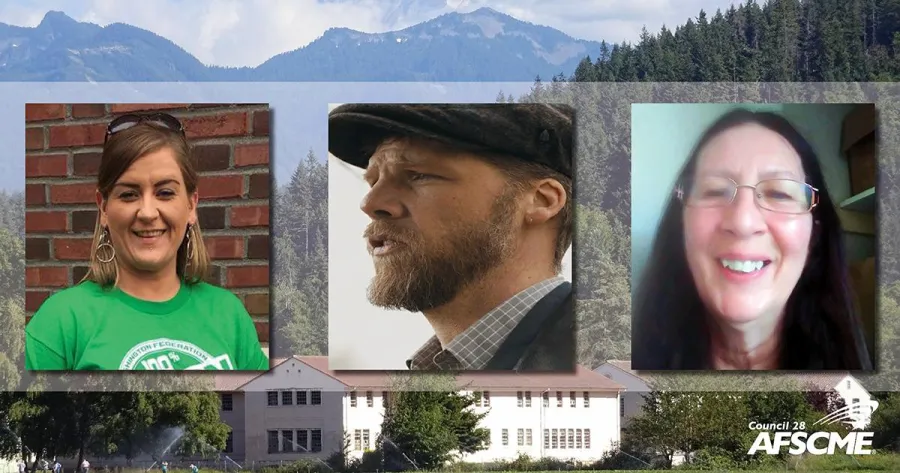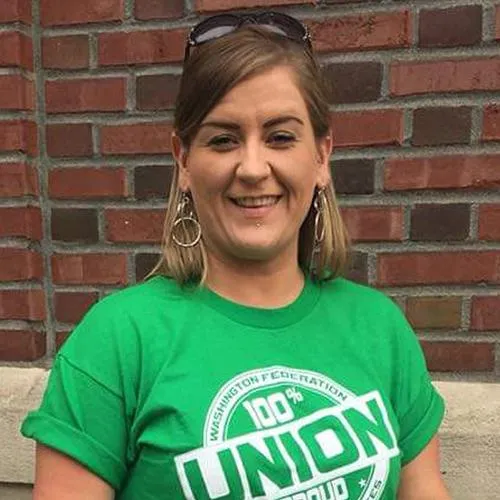Saving the Safety Net: WFSE Members Fight for Rainer School

Union activists mobilized to prevent an irresponsible closing of Rainier School, home to 300 clients with developmental disabilities.
In April of 2020, budget projections went off a cliff due to the impacts of the COVID-19 pandemic. Washington state’s budget, which relies on the spending habits of lower-income residents, is uniquely vulnerable to such disruptions.
In May, state agencies were required to come up with cost-reduction plans. Among the most harmful plans for Washington residents was the immediate closing of Rainier School, currently home to around 300 clients with intellectual and developmental disabilities.
“To me, personally speaking, it’s an honor and a privilege to take care of the state’s most vulnerable residents.”

The staff at Rainier School maximize client independence with medical and nursing care, interpersonal and life skills, and everything in between.
“It may take five years to teach someone how to wash their hands, but we persevere and do it,” said Carol Denison, a nurse who has worked at Rainier School for seven years. “To me, personally speaking, it’s an honor and a privilege to take care of the state’s most vulnerable residents.”
When Rainier School staff heard of a rushed closure, they mobilized to stop it.
Brittany Barber, an investigator at Rainier School and president of WFSE Local 491, worked with her local union’s executive board to write a letter to Governor Inslee explaining what was at stake.

When residential habilitation centers (RHCs) close abruptly, client care suffers. That has been proven in other states and in the personal experience of staff at Rainier School. This is why any closure of an RHC must include a transition timeline that considers individual client needs.
“We’ve seen clients die from aspiration pneumonia and other preventable conditions when they leave Rainier School,” said Barber. “They don’t get the same kind of care in the community as they get in a 24-hr facility.”
The letter also spoke up for the families of clients who would have no respite from intensive caretaking responsibilities if Rainier School closed.
“A lot of the clients have lived here their entire lives. It’s their safe place. Some have lived at Rainier School since shortly after it opened in 1939.”
When clients’ families heard about the potential closure they reached out to staff members like attendant counselor Julie Montgomery, who has worked at Rainier School close to 10 years.
“We didn’t have answers for them,” Montgomery said. “A lot of the clients have lived here their entire lives. It’s their safe place. Some have lived at Rainier School since shortly after it opened in 1939. They don’t want to leave. They can walk the grounds here. They have friends here.”
Rainier School steps up during pandemic
As COVID-19 cases surged, Rainier School helped ease the shortage of hospital beds by opening a facility for clients with developmental disabilities who had been waiting for placement in hospitals across the state.
To many staff members, their ability to keep clients safe during COVID-19 was proof positive that Rainier School was worth saving. Rainier School was the last residential habilitation center in the state to get a confirmed COVID-19 case.
“The pandemic was a huge test for us, and we passed it,” said Willis McNabb, an attendant counselor manager who has worked at Rainier School for 29 years.

“It speaks to the level of individualized care we provide," he said. "You just can’t get this kind of care anywhere. Our number one priority is our clients, and it shows.”
WFSE members at Rainier School mobilized to pressure lawmakers.
While they were waiting to hear back from the Governor, the WFSE Local 491 Member Action Team (MAT) was mobilizing coworkers to call and email lawmakers to prevent the closure.
“We were flooding legislators on a daily basis,” Barber said. “We had WFSE members from Western State Hospital, Eastern State Hospital, Yakima Valley School, Fircrest and Lakeland Village helping out and making calls on a daily basis. We owe a huge thanks to them.”
The calls worked.
The Governor reached out to WFSE members at Rainier School for a meeting, and they made their case. When the time came for Governor Inslee to release his budget, he did not include the closure of Rainier School.
The budget did direct the Developmental Disabilities Administration and the Department of Social and Health Services to examine the footprint of Rainier School, how it can best provide safety net services, and the possibility of providing new services there.
A seat at the table.
Thanks to engaged WFSE members, our union will have a seat at the table when stakeholders talk about how they reimagine Rainier School and the services it provides.
“This is definitely a win,” said Barber. “The fight will never be over, but the most important thing for our members to know is that Rainier School is staying open because of them. Because they were sending letters and making calls. It made an impact.”
“I chose this work for the moral obligation I have as a human.”
Regardless of what happens to Rainier School in the long run, Denison said she will continue doing what she’s always done.
“I worked in a corporation for a while, but I decided I was tired of making them rich with my sweat. I believe in public service and having a safety net for our society. I chose this work for the moral obligation I have as a human,” she said.

--
Not a WFSE Member? Join the nearly 47,000 public servants across Washington in speaking up for our jobs, families and communities. Join today.
